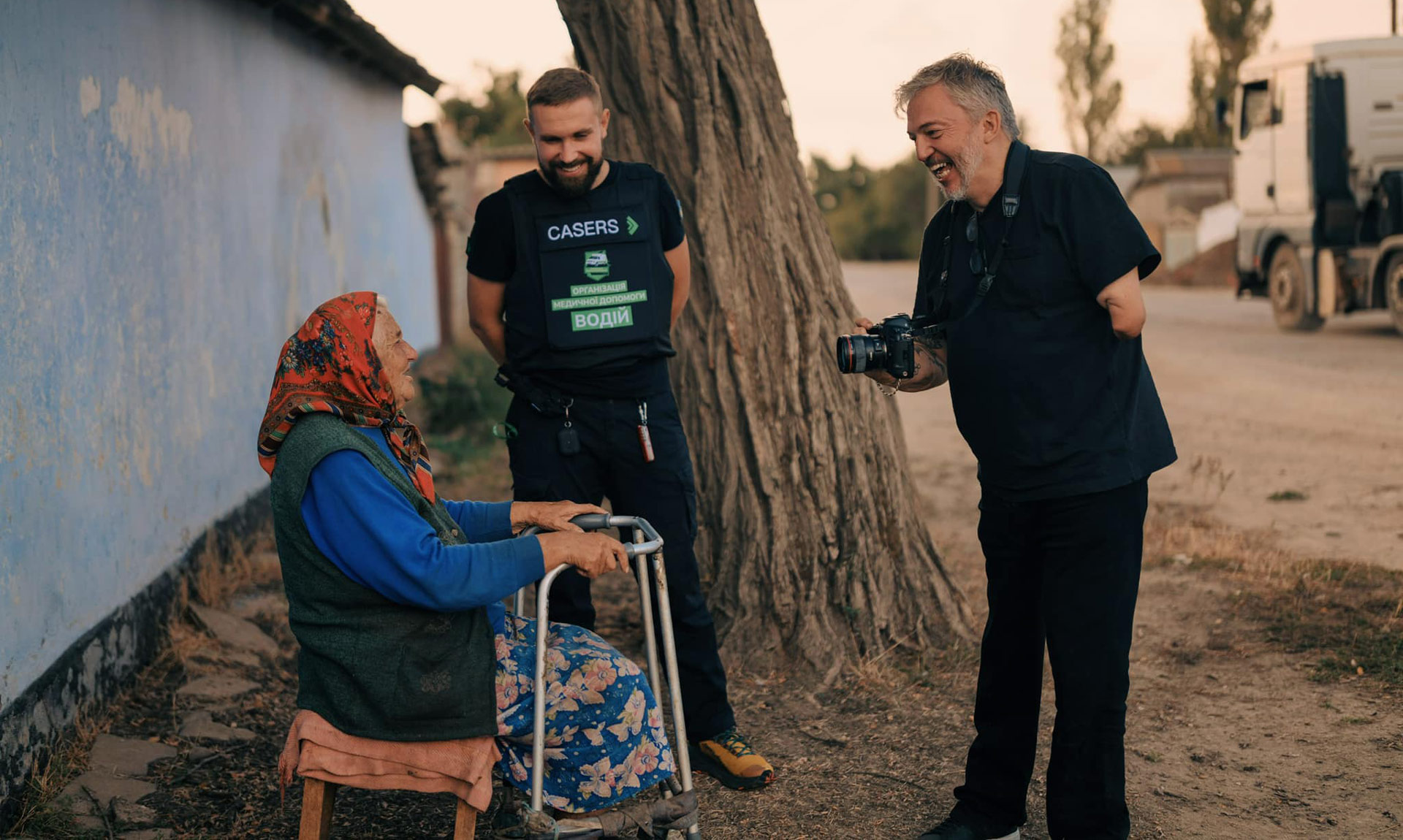Giles Duley, Documentary Photographer
Saturday 27th September 2025 • Hebden Bridge Town Hall
Save this date! We’re thrilled to announce a special evening with the incredible Giles Duley, one of the most significant photographers and storytellers of our time.
Giles’ photography captures the human side of war, focusing on the lives of everyday people affected by conflict. After losing both legs and his left arm to an IED in Afghanistan, Giles’ unique perspective allows him to share deeply personal and intimate stories of resilience and survival.

Giles Duley
The loss of these limbs gave him greater insight and empathy into people’s suffering and put him in a better position to tell their stories. As he said, ‘Because that’s all I am, a storyteller.’
His work avoids the typical images of violence, instead it showcases quiet moments like a grandmother brushing a granddaughter’s hair, a mother feeding her baby, a father on the floor doing lessons with his children.
Founder of the Legacy of War Foundation, Giles has dedicated his life to supporting communities in war-torn regions like Syria, Ukraine, and Rwanda. His work challenges the media’s focus on political outcomes, instead highlighting the lasting human impact of war and the strength of those who rebuild after conflict.
Giles’ said of his work: ‘I always try to eat with families and communities before I take photographs, it’s how I connect, through that greatest of storytellers. Food is the antithesis of war. Where war is about breaking apart communities and families, food is about bringing them together. In food I find my peace.’
This promises to be a powerful and unforgettable evening. Be sure to get your tickets when they are released—they’re bound to go fast!

Write-up by Roger Gill
Imagine listening to someone who lost both legs and one arm in an Afghanistan IED explosion. A photographer who survived against all odds by sheer willpower, refusing to be defeated. A hero who was told he would never drive again because prosthetic feet could not feel the pedals of a car. Then, as a listener, you discover that this giant of a survivor spent a whole year opening and closing the lid of a pedal bin with his false foot, until he could do it so well that driving once more became possible.
That was the kind of storytelling experience we shared last Saturday evening at Hebden Bridge Town Hall. Giles Duley, the acclaimed photographer and initiator of the Legacy of War Foundation, held us spellbound with tales about his life. He began his career photographing Rock and Roll legends such as Oasis and then he described his almost Road to Damascus conversion into a photographer of war victims. His life was tragically altered by the explosion that nearly ended his life, yet out of that disaster grew a mission fueled by fierce determination.
From the moment Giles, sitting quietly on stage, lifted his head and spoke his first words, the audience felt drawn together as if around a campfire on a velvet-black starry night, listening to a sage share hard-won truths. He told us of flying to the US to meet the two “Band of Brothers” medics who had carried him from the bomb site and helped save his life. After months of recovery in England, he met his saviours — and the three of them went out and got drunk. When the punchline of this story came, we laughed loudly, our anxiety about his survival was released in a wave of shared relief and joy.
According to the theory of storytelling, what we experienced is called “narrative transportation.” It didn’t matter if we knew the term or not — we felt its power. Carried by Giles’s words and images, we were exposed to stories of other survivors of war: women, children and families from Syria, Sudan, Rwanda, Lebanon, Gaza and Ukraine. His photographs, projected onto the screen, showed lives shattered by conflict — yet of people who somehow drew on reservoirs of resilience to keep going.
We saw women paralysed by snipers’ bullets, survivors of genocide, children bombed while playing in Ukrainian school playgrounds. These were not images of despair but of endurance and dignity. We heard how Giles’s Legacy of War Foundation supports people like this to find new purpose: for example, through the Land for Women project in Rwanda, giving women whose lives had been destroyed by violence the chance to build sustainable futures for themselves and their families.
At the root of Giles’s work is his belief that a purposeful life is nourished by love. His passion for food and eating together is part of his rationale. In many war-torn places, before taking any photographs, he cooks and eats with families. Stories are shared around the meal, trust is built, and only then does he begin to take his pictures. As he told us: “I will not photograph anyone unless I have eaten with them first.”
And so it was for us that evening. We sat with him, feasting on his stories, sustained not just by his images but by his humanity. His advice was simple but profound: each of us must find a true purpose, focus on what we can do rather than what we cannot, and do it with love and kindness. That is how change begins, not from the top down but from the bottom up.
Giles Duley does not call himself a war photographer. He calls himself a documenter of love. By the end of the evening, it was easy to see why.
We left Hebden Bridge Town Hall uplifted, his stories of resilience ringing in our ears, ready to look at our own
lives through the mirror he had held up for us.
Roger Gill































